Here on the eastern edge of the Top End of the Northern Territory, the culture of the Aboriginal inhabitants, and much of its environment, remain mysterious and unknown to outsiders.
In Arnhem Land, raging rivers run wild, savannah woodlands teem with remarkable wildlife, primeval wetlands brim with fish, crocodiles and exceptional marine animals, more than 260 species of birds flock to the skies and the word “remote” takes on fresh meaning.
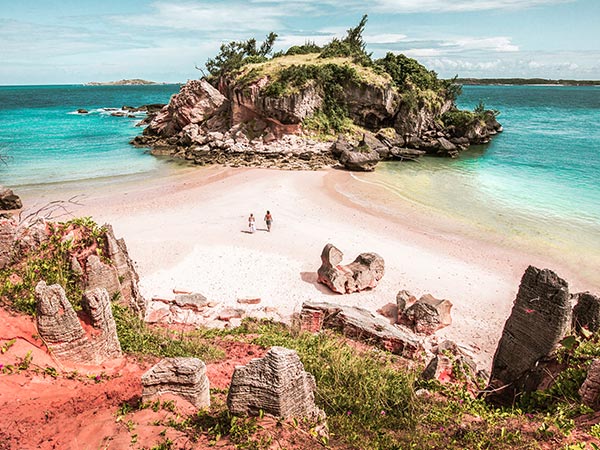
You might not be able to swim, but beaches at Bawaka, East Arnhem Land, are the most beautiful in Australia. (Image: Tourism NT/Hayley Anderson)
This vast, 97,000km2 region has just 18,000 inhabitants, with the majority continuing to live a traditional lifestyle on isolated homelands. The connection to country is strong, and traditional hunting and gathering activities are still practiced.
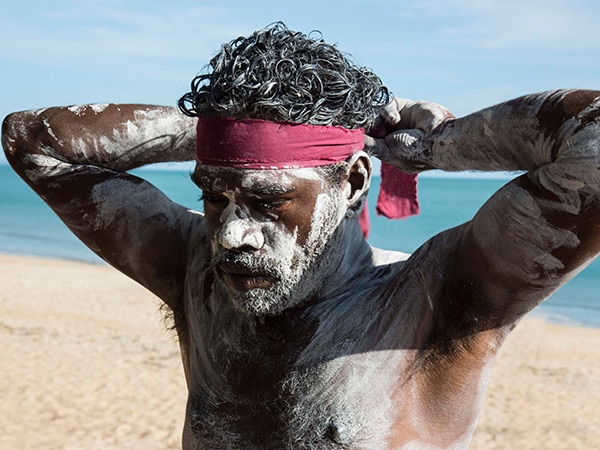
A Yolngu man from East Arnhem Land. (Image: Tourism NT)
Entry to Arnhem Land is by a free permit only (with minor exceptions like a day trip where you fly in and out).
If you’re travelling independently, you’ll need to apply to the Northern Land Council at least 10 working days before you leave. If travelling with a tour, your tour operator will make the application on your behalf.
Airnorth operates five flights per week from Darwin to Maningrida (www.airnorth.com.au).
The airport at Nhulunbuy in far northeast Arnhem Land is known as Gove, and Qantas and Airnorth have regular daily jet services from Darwin and Cairns.
Airnorth also flies daily to Groote Eylandt from Darwin. Charter flights land at the airstrip on the Cobourg Peninsula but here’s the rub: it’s a 2km drive to the campground with no public transport. More info: (08) 8999 4814.
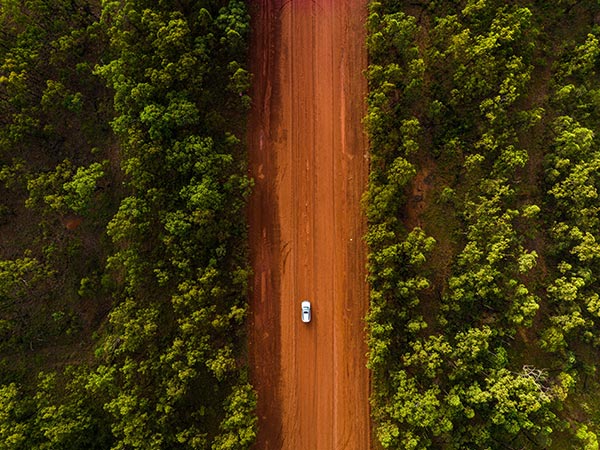
The Central Arnhem Highway is 710km of sheer adventure. (Image: Tourism NT/Sean Scott)
Access into Arnhem Land can be limited during the wet season (Nov-April). For the latest information on driving the Central Arnhem Road visit the NT Road Report website.
Whether you’re on tour or self-driving, remember you’re travelling on private land through sensitive cultural regions.
If driving to Nhulunbuy, take the turnoff to the Central Arnhem Highway 52km south of Katherine on the Stuart Highway.
It’s a further 710km to Nhulunbuy from the turnoff, only the first 60km of which is sealed. From then on the road is corrugated, slippery with loose gravel, and in some places heavy with bull dust.
The two major river crossings at the Wilton River near Bulman Aboriginal community and the Goyder River, about 400km from Nhulunbuy have now been replaced with bridges. However 4WDs are still recommended and fuel stops are rare.
The road to the Cobourg Peninsula is open during the dry season only, usually from May 1 to Oct 31.
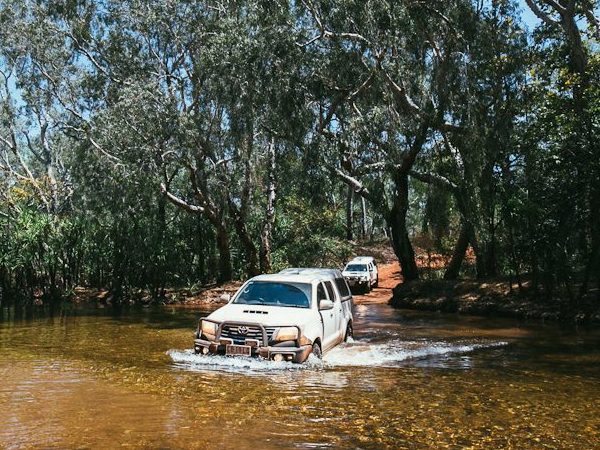
River crossings are all part of driving through east Arnhem Land, even in the dry. (Image: Elise Hassey).
It’s an unsealed road for 4WD vehicles only and will take eight hours to cover the 570km from Darwin to Black Point, with no permitted stops between the East Alligator River and the Garig Gunak Barlu National Park boundary.
Getting to Maningrida is a tad easier. It’s about 520km from Darwin via Gunbalanya and takes 6-7hrs (be careful to follow the signs).
There are a number of river crossings after Cahill’s Crossing before reaching the settlement. Access by road is usually limited to June-November inclusive, while the road between Maningrida and the community of Ramingining is closed to all non-local traffic.
Nhulunbuy has one petrol station and one large supermarket. Fuel and food are available at the Mainoru Outback Store, about 256km from the Stuart Highway on the Central Arnhem Highway. The last fuel stop before Gunbalanya, Cobourg Peninsula and Maningrida is at Jabiru, so make sure you carry extra fuel in jerry cans.
There’s no fuel available at Black Point on the Cobourg Peninsula but there’s a store open throughout the dry season. Maningrida has two supermarkets, four takeaway outlets and two petrol stations.
The NT now has an open road speed limit of 130km/h, but it’s recommended not to travel at more than 80km/h in Arnhem Land since conditions vary on the roads so much throughout the year. And unless you’re sure of the water depth, flow rate and any road damage never attempt to cross flooded bridges or causeways. Most importantly, do not ignore signs.
There’s also a lot of wildlife constantly moving across Arnhem Land, particularly at dawn and dusk. Stock and wildlife often feed on the edges of roads (be particularly wary of buffaloes). It also cannot be stressed enough that Arnhem Land is very isolated, and a missing vehicle is far easier to locate than missing people.
Never leave your vehicle, regardless of the circumstances. Economise on water if you’re away from the main road – and if you do intend to leave the main road, let someone know of your plans and expected time of arrival. Importantly, also let them know you’ve arrived safely. Carrying an emergency supply of fuel and food is a good idea wherever you’re going, and make sure you include at least 20 litres of water.
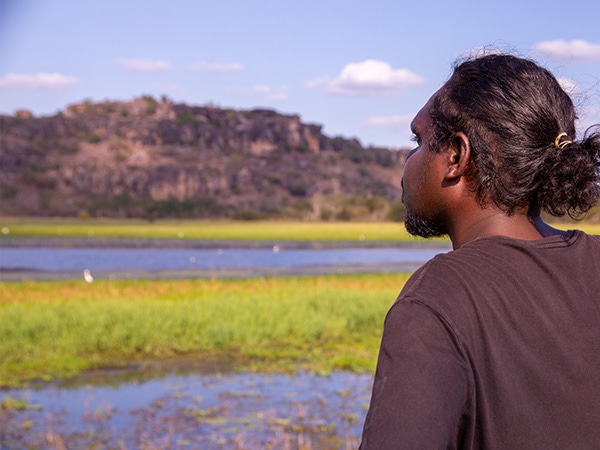
Stunning Gunbalanya, where mimi spirits play hide and seek. (Image: Tourism NT/Felix Baker)
The community of Gunbalanya (Oenpelli) lies about 15km from the border of Kakadu National Park.
Nearby is the rugged Arnhem Land Escarpment, known as the Stone Country, where deep plunging gorges, huge boulders and wide overhanging rock platforms dominate. Beyond the settlement is Gunbalanya billabong, surrounded by open flood plains and overshadowed by Injalak Hill, a site extensively rich in rock art paintings and a source of inspiration for the local artists.
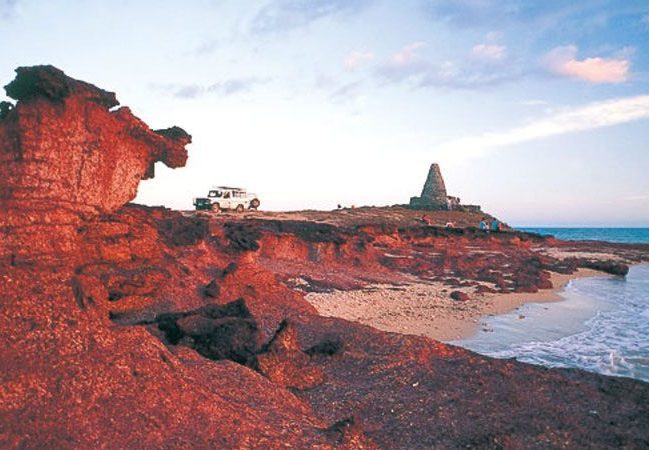
Red earth meets the sea at Cobourg Peninsula.
The Garig Gunak Barlu National Park includes the entire Cobourg Peninsula and surrounding waters of the Arafura Sea, Van Dieman Gulf and a few neighbouring islands in northwest Arnhem Land, a land area of 4500km2.
Only 15 vehicles a day are allowed into the park and permits are required for both entry and camping.
The journey is well worth the effort; this is a true wilderness. A highlight is a visit to the ruined Victoria Settlement, where the British made their third attempt to settle the Top End.
Sadly, it quickly became known as ‘The Forsaken Settlement’, as nearly every single person who lived here died – though that didn’t stop the English from trying to settle the area again… and again. (Eventually they succeeded nearby, with Darwin. Fifth time lucky.)
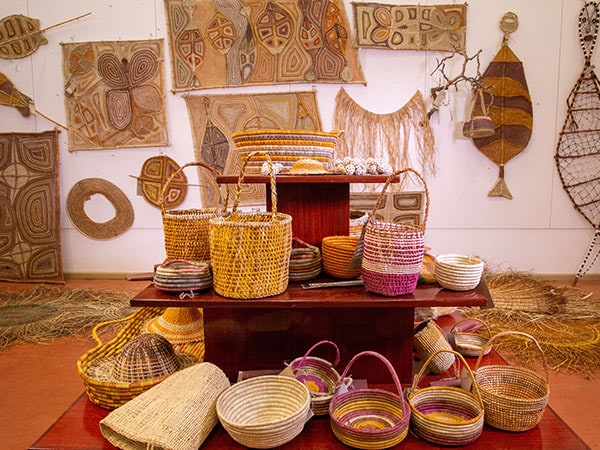
Browse the amazing selection at Maningrida Arts and Culture. (Image: Tourism NT/Felix Baker)
At the mouth of the Liverpool River, Maningrida is in the heart of west Arnhem Land, where the landscape of the rocky escarpment country meets sprawling flood plains that feed meandering river systems.
It’s largely comprised of monsoon woodlands intermingled with billabongs and riverine habitats turning into one vast wetland during the wet season. Maningrida is a centre for 34 homelands, home to 2600 people, and fosters more than 800 artists through Maningrida Arts and Culture.
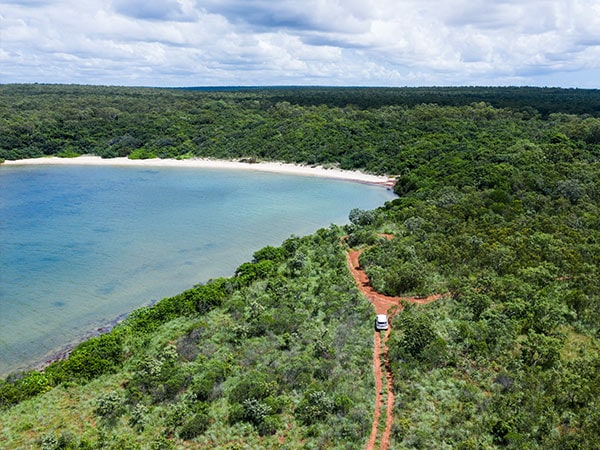
Find a campsite or take a day trip to Garanhan / Macassan Beach, located south of the township of Nhulunbuy. (Image: Tourism NT/Rob Mulally)
On the far northeastern tip of the NT mainland, spectacular coastal landforms with hundreds of offshore islands, cays, reefs and estuaries fairly churning with marine life, combined with a strong Aboriginal cultural presence, define the Eden that is the Gove Peninsula.
And, good news, everything is easily accessible from the regional centre, Nhulunbuy, a town of 3500 people. Built in the 1970s to service bauxite mines, the town has become the focal point for tourism.
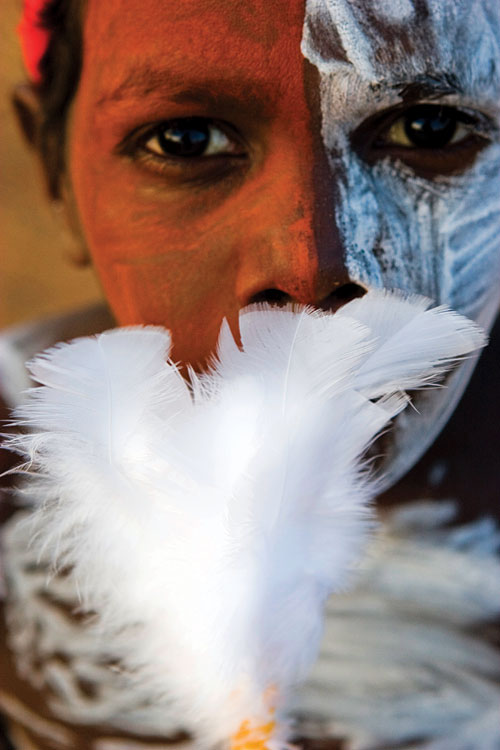
A feathered dancer at Garma festival, held near Yirrkala in East Arnhem Land. (Image: Quentin Long)
Garma Festival is held in Gulkula – a 30-minute drive from Nhulunbuy.
The Yolngu people also are exponents of the yidaki (didgeridoo) and their musical ancestry has spawned such performers as Mandawuy Yunupingu and his band, Yothu Yindi.
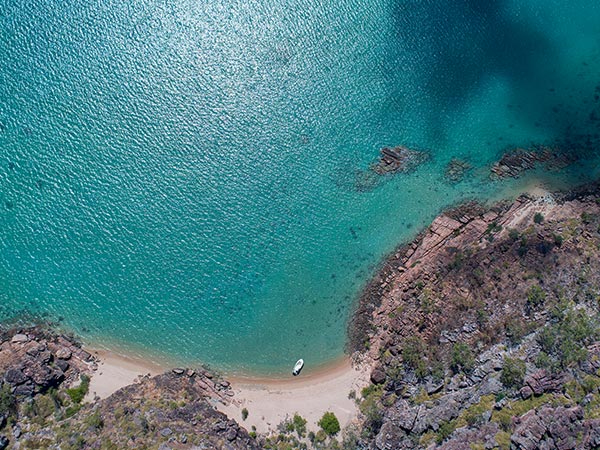
Visit Groote Eylandt, or “large island”. (Image: Tourism Australia)
Abel Tasman was the first European to sight the largest island in the Gulf of Carpentaria in 1644, naming it Groote Eylandt, or “large island”.
Since then the homeland of the Anindilyakwa people has remained relatively isolated. Some development occurred as a result of a magnesium mining operation that began in the 1960s, but the community shunned tourism.
This all changed in 2007 with the opening of Groote Eylandt Lodge and the gradual entry of the Anindilyakwa into cultural tourism. Groote Eylandt Archipelago is now a significant new addition to the Aussie traveller’s holiday planner.
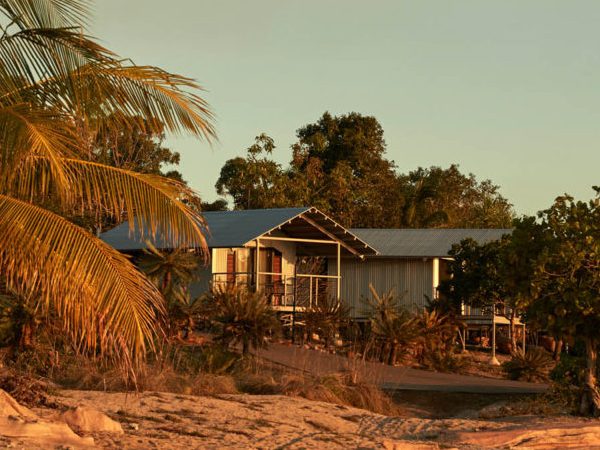
Stay on the sand among the mangroves at the remote Groote Eylandt Lodge (Image: Sean Fennessy).
A select number of operators have cornered the market on quality fishing expeditions in Arnhem Land. For a full list check out the fishing page on Northernterritory.com. Meanwhile here are a few selections.
Banubanu // Personalised fishing charters from Banubanu Beach Retreat off Bremer Island in east Arnhem Land.
Arnhem Land Barramundi Lodge // Caters for anglers seeking remote sportfishing experiences with comfortable tented lodge accommodation near Maningrida.
Arnhem Land is rich with Indigenous art. Here are three repositories you shouldn’t miss.
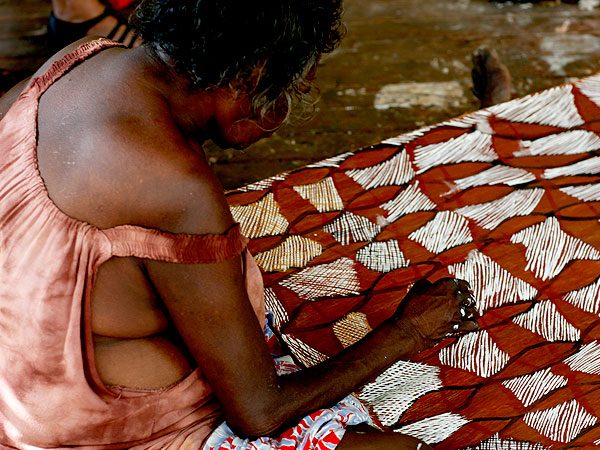
Artist Barrupu Yunupingu, sister of Mandawuy Yunupingu, lead singer of Yothu Yindi, at Yirrkala works on her fire-inspired piece. (Photo: Quentin Long)
Anindilyakwa Arts on Groote Eylandt
Injalak Arts and Crafts at Gunbalanya.
Maningrida Arts and Culture at Maningrida.
Buku-Larrnggay Mulka at Yirrkala Community near Nhulunbuy.
From living in an Aboriginal family home to making your own didgeridoo, there are plenty of ways to expand your cultural horizons in Arnhem Land.
Nhulunbuy & surrounds
There’s a wide selection of Yolngu Cultural Programs available in Nhulunbuy mostly organised by and through Lirrwi Tourism.
One of the most popular is the women’s multi day tour and we loved the Bawaka experience.
Groote Eylandt
Groote Eylandt Touring Company // More than just fishing the touring company can organise cultural tours as well.
Gunbalanya
Injalak Hill Tour // Walk through beautiful sandstone caves filled with ancient remnants of Aboriginal dwellings and rock paintings.
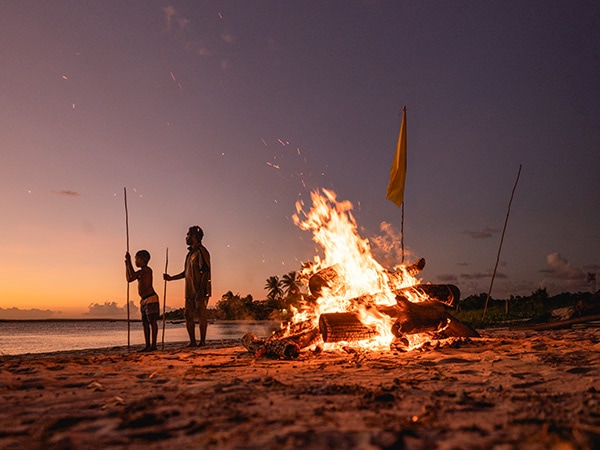
Visit Bawaka on a Lirrwi multi-day tour. (Image: TourismNT/Rob Mulally)
Music is a powerful part of Aboriginal culture and the music of Arnhem Land is an exciting mix of Western and traditional sounds. Think about picking up some CDs before your trip so you can listen to the talent in situ, most of the below are available from Skinny Fish Music.
1. Milkay Mununggurr // Renowned didgeridoo exponent, plays traditional music from coastal west Arnhem Land.
2. The Nabarlek Band // The boys from Manmoyi outstation cut their teeth on four upturned flour tins and snaggle-stringed guitars. With four albums to their credit, they combine traditional sounds with a rock/reggae beat.
3. Yothu Yindi // You may have listened to them in the late ’80s but the music is more relevant when walking along a beach in east Arnhem Land with the vocals of Mandawuy Yunupingu singing in your ears.
4. Geoffrey Gurrumul Yunupingu // Hailed from northeast Arnhem Land and was a former member of Yothu Yindi. Before his death in 2017 he sang with the Saltwater Band from his homeland of Galiwin’ku on Elcho Island and pursued his solo career.
5. Lonely Boys // Hard rock from the remote community of Ngukurr, they won the Barunga Battle of the Bands in 2006.
6. King Stingray//Self-described as a Yolngu surf-rock band. These musicians from Nhulunbuy have made their way up the Australian music charts with their surf rock melodies and powerful storytelling.
There’s no better way to see the communities of Arnhem Land come to life than by timing your visit with one of these major annual events.
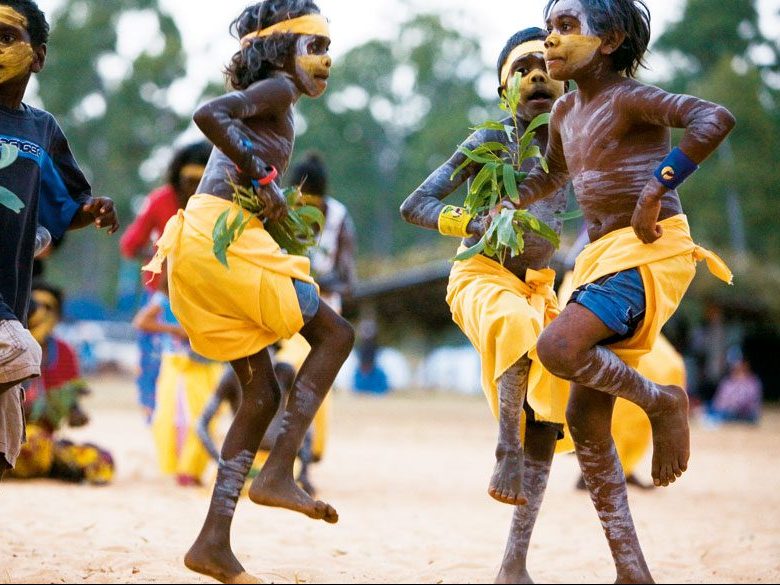
Garma Festival, NT: Indigenous culture at is most vibrant and lively. (Photo: Quentin Long)
Barunga Sports and Cultural Festival, June // Traditionally an opportunity for different clan groups from all over the Top End, Qld, the desert, SA and WA to come together, share knowledge, dance and play sport, the Barunga Festival is evolving into a cross-cultural celebration and information-sharing opportunity. The $20 entry fee includes camping and Jessica Mauboy Concert. Central Arnhem Hwy, Barunga.
Garma Festival, August // Australia’s foremost Indigenous cultural exchange event, Garma attracts more than 3000 people from diverse clan groups. This celebration of Yolngu culture is a sharing of knowledge and an encouragement of continuing traditional practices. Entry fees apply. Gulkula, northeast Arnhem Land.
Here’s a selection of quality tour guides operating in the region. For a full list of all operators, check out the Arnhem Land tour page on northenrterritory.com.
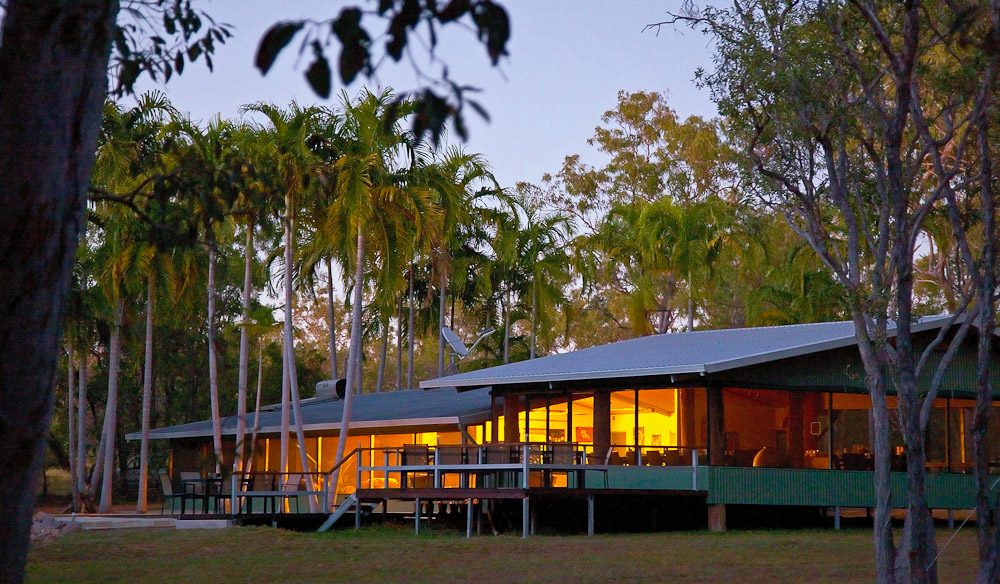
The camp at Davidson’s Arnhem Land Safaris, NT
1. Davidson’s Arnhemland Safaris // Visit Mt Borradaile, one of the most significant art sites in Australia, and investigate one of Australia’s most pristine environments. Read about our visit to Mt Borradaile or perhaps preview the best rock art in Australia.
2. Lords Kakadu & Arnhem Land Safaris // Award-winning operator with a range of tours.
3. Venture North // Offers exclusive touring to the Cobourg Peninsula, starting with four-day Arnhem Land & Cobourg Peninsula Tour. Read our adventure with Venture North through East Arnhem Land.
4. Brookes Safaris // Personalised high-end touring for the discerning traveller throughout Arnhem Land and across the Top End.
5. Intrepid Travel // Offering week-long experiences through Nhulunbuy and Bremer Island.
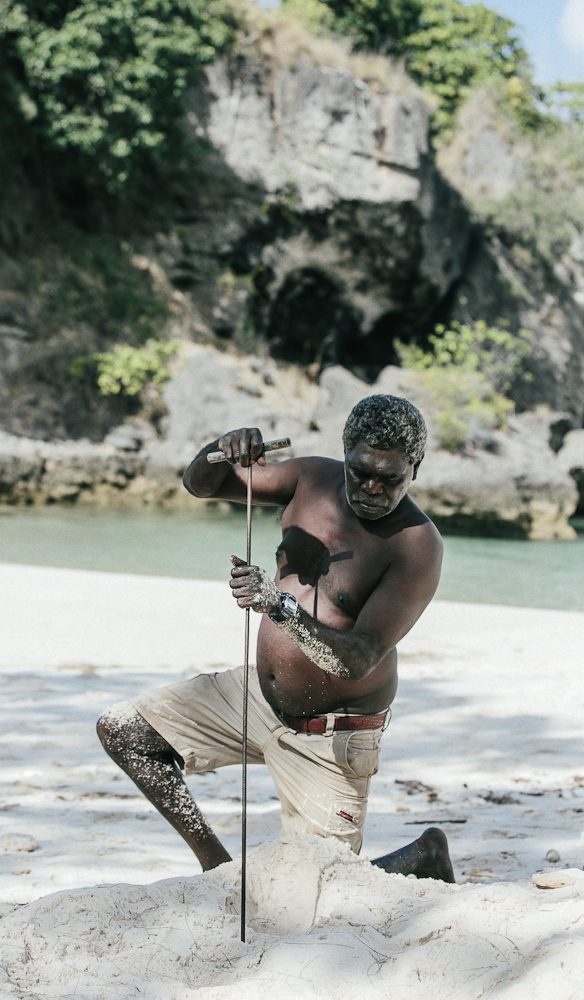
Hard-won right: Waka Mununggurr digging for turtle eggs, East Arnhem Land (photo: Elise Hassey).
Permits from the Northern Land Council are required to travel in Arnhem Land.
These are free, but the paperwork must be lodged prior to your trip and approval granted. If you’re travelling with an accredited touring company, your tour package should include your permit. For information on how to apply, click here.
For info on Groote Eylandt permits, contact the Anindilyakwa Land Council or (08) 8987 4040.
You will also require a permit from the NT Parks and Wildlife to travel to the Cobourg Peninsula overnight.
The tropical dry season is May-Oct and is the so-called “winter”, during which temperatures hover around 28ºC with superb tropical nights warm enough to dine out under the stars.
Rainfall is usually during the tropical summer season from Nov-April and daytime temperatures are around 30-33ºC with sea breezes.
Nhulunbuy has Westpac Bank and there are ATMs in the bank and the Walkabout Lodge.
Maningrida has an ANZ Bank as well as several ATMs around the community. There’s an ANZ Bank in Alyangula on Groote Eylandt, as well as ATM access. There’s no ATM or bank in Gunbalanya or on the Cobourg Peninsula.
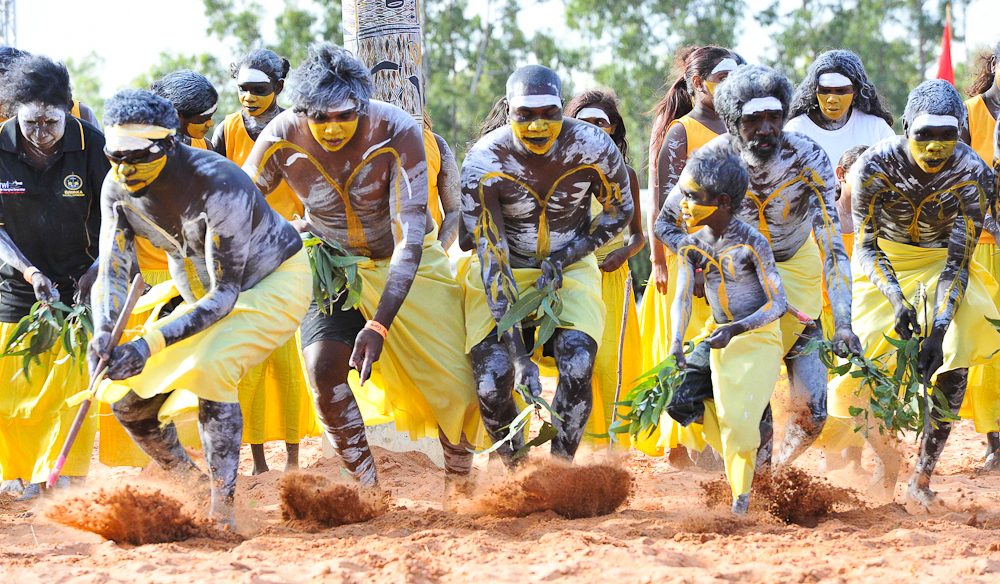
Immerseyourself in Indigenous culture in Arnhem Land with Lirrwi Tourism (Image: Wayne Quilliam).
Whether on tour or self-driving, remember you’re travelling on private land through sensitive cultural regions.
Aboriginal people tend to be polite to strangers and are thus more inclined to “agree” to requests from visitors, such as being the subject of photos, even if it’s something they don’t want to do.
Avoid taking advantage of the hospitality of your Indigenous hosts; don’t offend or intrude.
Sacred sites are vital spiritual and cultural places that link Aboriginal people to their cultural traditions and the land. Please respect this, and the wishes of the Traditional Owners, by avoiding and respecting sacred sites.
1. A big water bottle // You’ll need to drink at least two litres of water a day.
2. The right clothes // Light-coloured, lightweight clothing that covers tummies, bottoms and legs. Aboriginal people are very conservative and for women, exposing skin below the waist and above the knees is considered inappropriate.
3. Sturdy walking shoes // The rocky terrain can be very challenging.
4. Insect repellent // Mosquitoes are big and active around sunset, so repellent with a DEET base is important.
5. Thinking of your pet // Pets aren’t allowed in any NT National Parks or in most of Arnhem Land. The exception being Nhulunbuy and the surrounding area including the Dhimurru campgrounds. Boarding facilities are available in Darwin and Katherine.
6. An open mind // Your visit to Arnhem Land will definitely be enhanced by leaving all preconceived notions behind.
For the  best travel inspiration delivered straight to your door.
best travel inspiration delivered straight to your door.
This is one of my dream destinations after growing up in Darwin but moving south as an teenager have visited on flying visits but will drive next time.
Hi. I am wanting to travel into Arnhem Land. Basically to look around and probably do a little fishing.
Do I need to have a plan of where to go, or can I just drive and camp, in designated areas?
Also is there an information centre, in Darwin, where I can plan a trip?
Thanks
Mike Dickinson.